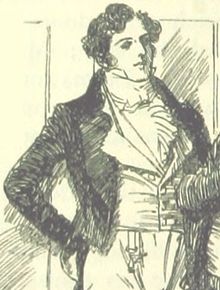
Emma is a novel written by English author Jane Austen. It is set in the fictional country village of Highbury and the surrounding estates of Hartfield, Randalls and Donwell Abbey, and involves the relationships among people from a small number of families. The novel was first published in December 1815, although the title page is dated 1816. As in her other novels, Austen explores the concerns and difficulties of genteel women living in Georgian–Regency England. Emma is a comedy of manners.

Clueless is a 1995 American coming-of-age teen comedy film written and directed by Amy Heckerling. It stars Alicia Silverstone with supporting roles by Stacey Dash, Brittany Murphy and Paul Rudd. It was produced by Scott Rudin and Robert Lawrence. The film is a loose adaptation of Jane Austen's 1815 novel Emma. The plot centers on a beautiful, popular, and rich high school student who befriends a new student and decides to give her a makeover while playing a matchmaker for her teachers and examining her own existence.
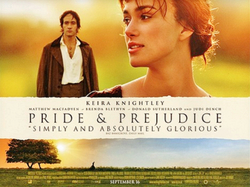
Pride & Prejudice is a 2005 romantic drama directed by Joe Wright, in his feature directorial debut, and based on Jane Austen's 1813 novel of the same name. The film features five sisters from an English family of landed gentry as they deal with issues of marriage, morality and misconceptions. Keira Knightley stars as Elizabeth Bennet, while Matthew Macfadyen plays her romantic interest Mr Darcy.

Emma is a 1996 period comedy film based on the 1815 novel of the same name by Jane Austen. Written and directed by Douglas McGrath, the film stars Gwyneth Paltrow, Alan Cumming, Toni Collette, Ewan McGregor, and Jeremy Northam.

Emma is a television film based on the 1815 novel of the same name by Jane Austen, directed by Diarmuid Lawrence and dramatised by Andrew Davies, the same year as Miramax's film adaptation of Emma starring Gwyneth Paltrow was released. This production stars Kate Beckinsale as the title character, and also features Samantha Morton as Harriet Smith and Mark Strong as Mr. Knightley.

Emma was a six-part TV serial adaptation of Jane Austen's 1815 novel Emma by BBC Television that was broadcast in 1972. It was directed by John Glenister.

Anne Elliot is the protagonist of Jane Austen's sixth and last completed novel, Persuasion (1817).
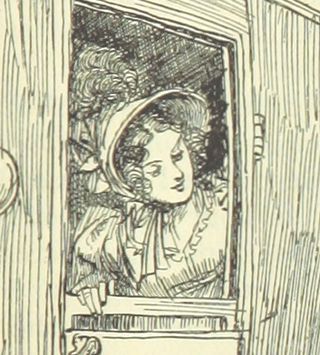
Emma Woodhouse is the 21-year-old titular protagonist of Jane Austen's 1815 novel Emma. She is described in the novel's opening sentence as "handsome, clever, and rich, with a comfortable home and a happy disposition... and had lived nearly twenty-one years in the world with very little to distress or vex her." Jane Austen, while writing the novel, called Emma, "a heroine whom no-one but myself will much like."

Emma is a four-part BBC television drama serial adaptation of Jane Austen's 1815 novel Emma. The episodes were written by Sandy Welch, writer of previous BBC costume dramas Jane Eyre and North & South, and directed by Jim O'Hanlon. The serial stars Romola Garai as the titular heroine Emma Woodhouse, Jonny Lee Miller as her loyal lifelong friend Mr. Knightley, and Michael Gambon as Emma's father, Mr. Woodhouse. The serial originally ran weekly on Sunday nights on BBC One from 4 to 25 October 2009.
Jane Austen's (1775–1817) distinctive literary style relies on a combination of parody, burlesque, irony, free indirect speech and a degree of realism. She uses parody and burlesque for comic effect and to critique the portrayal of women in 18th-century sentimental and Gothic novels. Austen extends her critique by highlighting social hypocrisy through irony; she often creates an ironic tone through free indirect speech in which the thoughts and words of the characters mix with the voice of the narrator. The degree to which critics believe Austen's characters have psychological depth informs their views regarding her realism. While some scholars argue that Austen falls into a tradition of realism because of her finely executed portrayal of individual characters and her emphasis on "the everyday", others contend that her characters lack a depth of feeling compared with earlier works, and that this, combined with Austen's polemical tone, places her outside the realist tradition.

Georgian society in Jane Austen's novels is the ever-present background of her work, the world in which all her characters are set. Entirely situated during the reign of George III, the novels of Jane Austen describe their characters' everyday lives, joys, sorrows, and loves, providing insight into the period.
Colonel Brandon is a fictional character in Jane Austen's 1811 novel Sense and Sensibility. A quiet and reserved man, he forms an attachment to the middle Dashwood sister, Marianne whom he eventually marries happily.
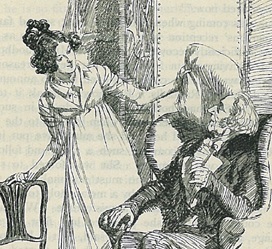
Mr Henry Woodhouse is a central character in Jane Austen's 1815 novel Emma and the father of the protagonist, Emma Woodhouse. He is a wealthy member of the English landed gentry who owns a large country estate.

Mr William Collins is a fictional character in the 1813 novel Pride and Prejudice by Jane Austen. He is the distant cousin of Mr Bennet, a clergyman and holder of a valuable living at the Hunsford parsonage near Rosings Park, the estate of his patroness Lady Catherine De Bourgh, in Kent. Since Mr and Mrs Bennet have no sons, Mr Collins is also the current heir presumptive to the Bennet family estate of Longbourn in Meryton, Hertfordshire, due to the estate being entailed to heirs male. Mr Collins is first introduced during his visit to Longbourn. His dull-witted character is in parallel to another 'Austen' character, Mr. Rushworth, from Mansfield Park. Mr Collins is also somewhat comparable to the Shakespearean character, Malvolio, from Twelfth Night.
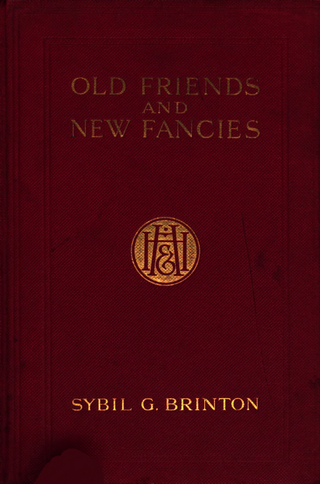
Old Friends and New Fancies: An Imaginary Sequel to the Novels of Jane Austen (1913) is a novel by Sybil G. Brinton that is often acknowledged to be the first sequel to the works of Jane Austen and as such is possibly the first piece of published Austen fan fiction, although earlier examples have been described by Sarah Glosson. It incorporates characters from each of Austen's six major novels into one unified story, alongside characters of Brinton's own invention. Keeping to the spirit of the source novels, its major theme is the difficulties faced by assorted pairs of lovers placed within the class structure of early 19th century Britain.
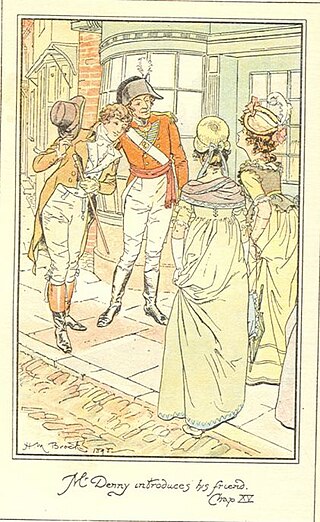
George Wickham is a fictional character created by Jane Austen who appears in her 1813 novel Pride and Prejudice. George Wickham is introduced as a militia officer who has a shared history with Mr. Darcy. Wickham's charming demeanour and his story of being badly treated by Darcy attracts the sympathy of the heroine, Elizabeth Bennet, to the point that she is warned by her aunt not to fall in love and marry him. It is revealed through the course of the story that George Wickham's true nature is that of a manipulative unprincipled layabout, a ne'er-do-well wastrel, compulsive liar and a degenerate, compulsive gambler, a seducer and a libertine, living the lifestyle of a rake. Lacking the finances to pay for his lifestyle, he gambles regularly and cons credit from tradesmen and shopkeepers and skips out on paying-up.
Emma Approved was an American multi-platform web series starring Joanna Sotomura and Brent Bailey based on Jane Austen’s 1815 novel Emma. The show is a follow-up to The Lizzie Bennet Diaries and is the third production out of web series company and YouTube channel, Pemberley Digital. In the series, Emma Woodhouse is reimagined as a lifestyle coach and matchmaker who is filming herself for the future documentary about her life. Emma Approved aired twice weekly on Pemberley Digital's YouTube channel starting October 7, 2013. The show consisted of 72 episodes, ranging from five to seven minutes in length. The series ended on August 23, 2014 and has accumulated over 3 million views on the Pemberley Digital YouTube channel. On September 19, 2018, a video featuring Sotomura and Bailey as Emma and Alex announced that a continuation of the series would be starting in October 2018. Due to lack of funding raised from online sources - such as GoFundMe - the sequel series ended after just seventeen episodes, with the new story left incomplete.
Mr Weston is a supporting character in Jane Austen's novel Emma, written in 1815. He marries the governess of the heroine, Emma Woodhouse, and it is the arrival of his son, Frank Churchill, in Highbury that sets the events of the plot in motion.
Miss Bates is a supporting character in Jane Austen's 1815 novel Emma. Genteel but poor, and a compulsive talker, she is memorably insulted on one occasion by the book's heroine, to the latter's almost immediate remorse.
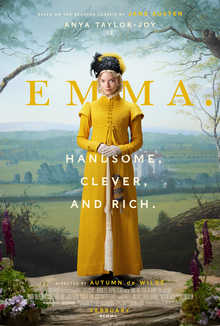
Emma is a 2020 period romantic comedy film directed by Autumn de Wilde, from a screenplay by Eleanor Catton, based on Jane Austen's 1815 novel of the same name. It stars Anya Taylor-Joy as Miss Emma Woodhouse, a wealthy and elegant young woman living with her father in Regency-era England who amuses herself with matchmaking and meddles in the romantic lives of those closest to her. The film also stars Johnny Flynn, Josh O'Connor, Callum Turner, Mia Goth, Miranda Hart, and Bill Nighy.
